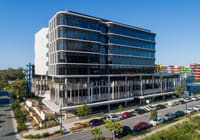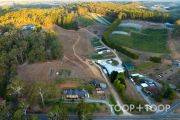
Costa family backs $120m raising for Riverina almond project
The Costa family has joined other wealthy families and an institutional investor in piling into a $120 million equity raising to fund the acquisition and development of three irrigation properties in the Riverina region of NSW that will be converted into high-yielding almond orchards.
The acquisitions are part of a new investment vehicle put together by agricultural development firm goFARM, which is jointly owned by managing director Liam Lenaghan and Costa Asset Management, the private investment arm of the Rich List Costa family, who founded fruit and veg giant Costa Group.

The three properties near Griffith include the 700 hectare Stephendale Vineyard at Yenda, where the vines are in the process of being removed to make way for nut plantings. The vineyard, one of the largest in the region, was previously owned by Hong Kong-listed conglomerate CK Life Sciences and, before that, by the once ASX-listed Challenger Wine Trust.
goFARM also snapped up the 585ha Greenview farms at Tabbita north of Griffith from the Schembri family, where almonds will also be grown. A third property in the region was acquired primarily for its attached water entitlements.
In total, the acquisitions comprise 1758ha of farmland within the Murrumbidgee Irrigation Area, as well as existing infrastructure (which will be repurposed) and 5000 megalitres of high and general security water entitlements.
goFARM raised the $120 million in less than a month, highlighting the strong appetite for high-yielding agricultural investments despite headwinds being felt by the sector from higher interest rates, a drier seasonal outlook, and lower commodity prices.
Mr Lenaghan said the successful raising was built on goFARM’s track record of “delivering good outcomes on previous investments”.

“We’re targeting mid-teen [total] returns, having bought these properties off-market at below replacement cost,” he told The Australian Financial Review.
“Agriculture is still well-supported by institutional investors because of the long-term theme of food security.”
Mr Lenaghan said all the new uses for farmland, including biodiversity, carbon and renewable energy had added to the appeal of the sector.
The three acquisitions build on goFARM’s $1.1 billion portfolio of assets under management, including 88,000ha of high-value agricultural crops, including grains, oilseeds, pulses, citrus and tree nut crops.
Founded in 2013, its strategy is to acquire, turn around and maximise large farming assets.
Mr Lenaghan acknowledged that the boom in agriculture over the past two decades was unwinding as interest rates increased, but said it was “difficult to generalise, and that the market is not homogenous”.
“Our strategy is not to buy the whole market. We do our research to get insights and convictions as to what are the opportunities in the submarkets, and we have a growth strategy to transform these assets,” he said.
With almond prices low and new plantings taking three years to produce nuts and about seven to reach full maturity, Mr Lenaghan said it was a good counter-cyclical opportunity to develop these assets.
“Almonds are a mega nut, a high value and labour efficient horticultural crop that can generate good returns on water [usage],” he said.
In Griffith, where the warm-climate red wine industry has been hit hard by the China trade ban, vineyards like Stephendale had reached the end of their lifecycle and were primed to be redeveloped, Mr Lenaghan said.
But in Tasmania’s better performing cooler climate wine regions, goFARM has started planting the first stage of a 400ha cool-climate vineyard portfolio in the Tamar Valley.











